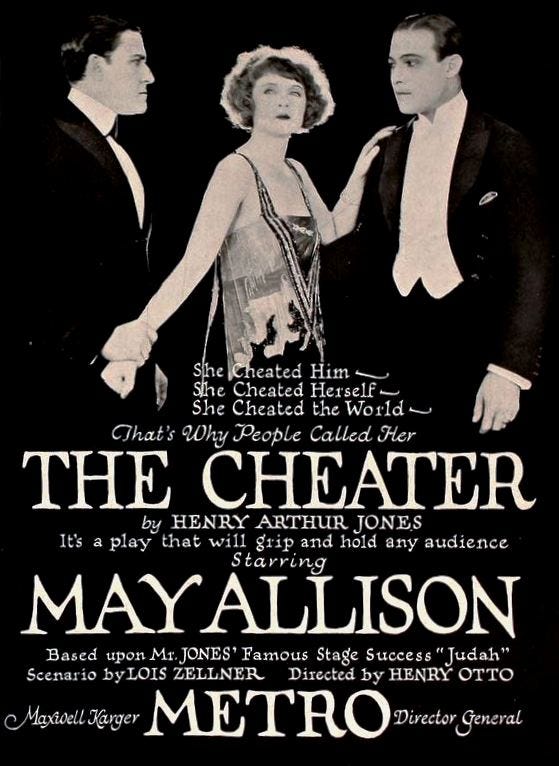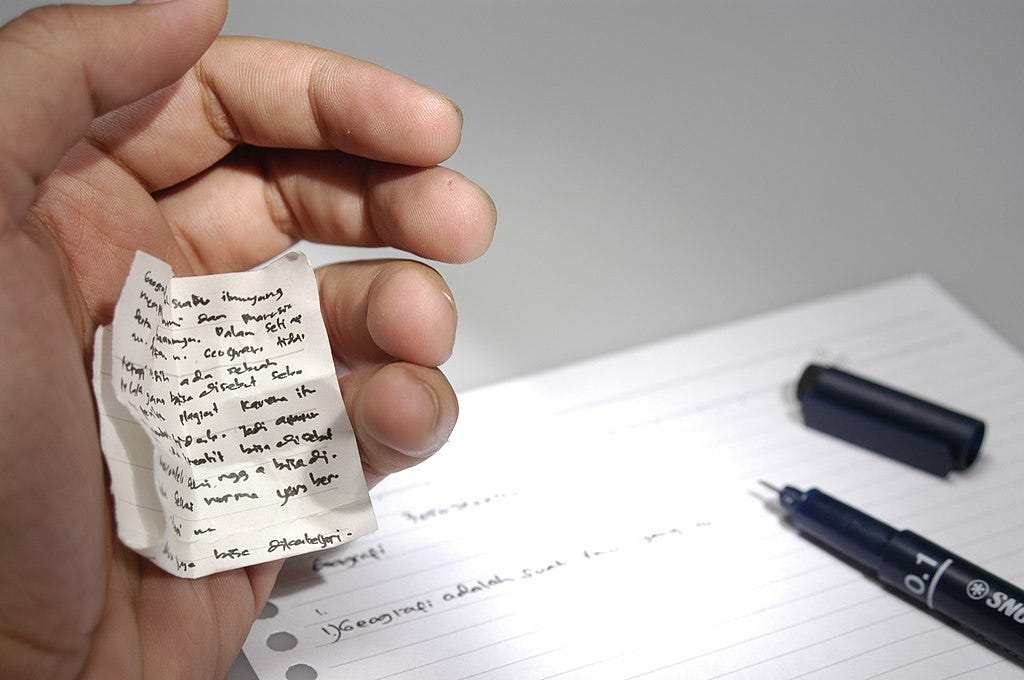Welcome to Friday Footnotes, a short weekly newsletter from Storygram Labs (with pictures!) about reading, motivation, children’s books, education, writers, and whatever else catches our attention.
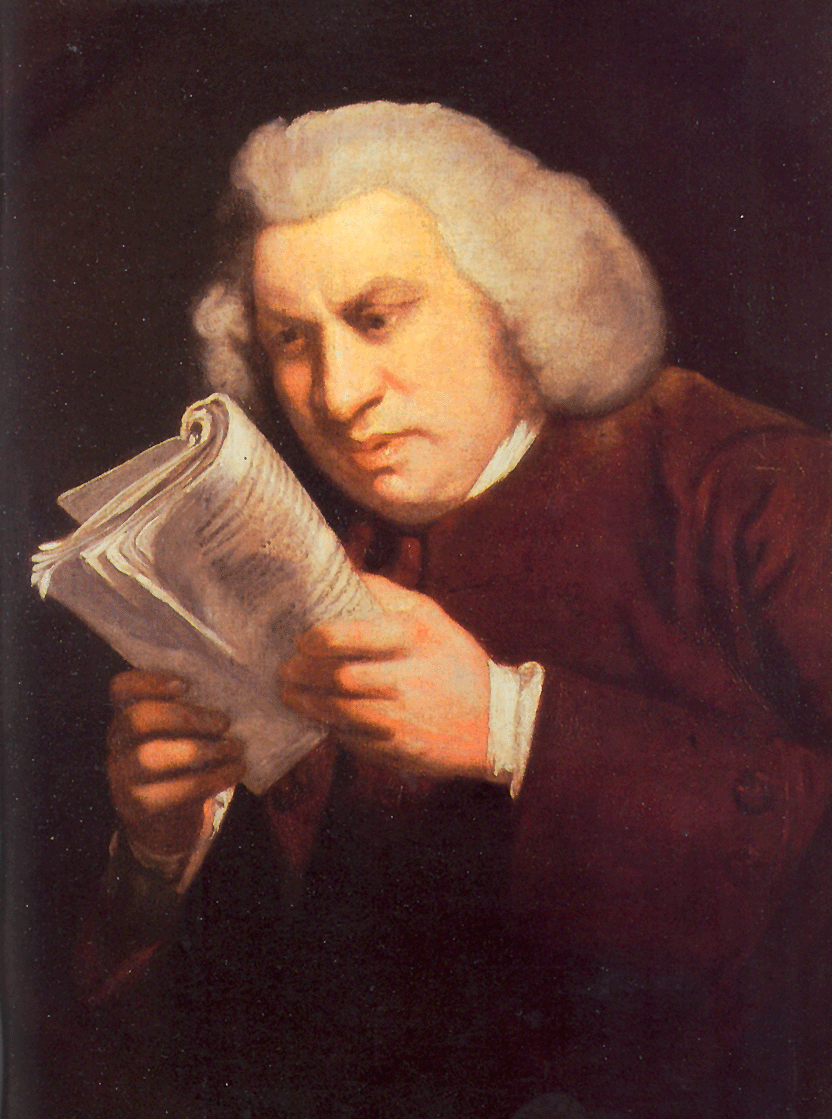
Three quick things 🧐
1. Young people have become used to a lack of basic discipline in their daily lives 🎻
Or so says violinist, Nicola Benedetti, who believes that, “listening properly to classical music for 15 minutes a day is as important for a child as reading a book”.1
Perhaps they could do both? 👀
Nicola is, no doubt, exceptional…
At 8, she was leading the National Children’s Orchestra of Great Britain 👼
At 15, she quit the Yehudi Menuhin School because she wanted to focus even more intently on her playing than the school’s academic schedule allowed 🤮
She won the BBC’s Young Musician of the Year competition and signed a £1m, six-album record deal with Universal Music 💵
… and she does make a compelling argument against shortcuts for aspiring musicians:
“The future of classical music is definitely threatened by the changes to work ethic and mentality. You cannot cheat your way through learning a musical instrument: ChatGPT is not going to teach you the violin. It’s impossible to learn music on any level with AI. You cannot fake your way to becoming a musician. Yet I think young people have become used to a lack of basic discipline in their daily lives2 – and that really worries me.”
However, putting the onus on young people seems misplaced. Surely, it is the responsibility of adults to pass on the ‘secrets’ of discipline, conscientiousness, and delayed gratification, to the next generation. Young people can’t be expected to learn these things on our own.
2. Overcoming LLM-cheaters via analog tests 🤖
While we’re on the topic of LLM cheats (students using ChatGPT to write your essays, for example), this article, I'm making my students read a book, by Helen Choi caught our attention.
Helen teaches writing to engineering students, and writes:
I’ll admit that ChatGPT caught me off-guard. I was so busy celebrating the return to campus that I hadn’t bothered to revise my COVID-era writing course with its online everything… I just skipped to campus and implemented my array of digital tools uncritically— even when it resulted in what Jenny Lederer and Jennifer Trainor describe as a “breakdown in classroom and campus community”.
She suddenly found LLM usage was out of control, and that along with this, the interactions with students were becoming “fraught with a degree of hostility and condescension”.
Her solution? Implement analog methods to determine student performance and understanding, pulling the rug from under the LLM’s non-existent feet:
I added more verbal components, such as individual conferences to discuss paper topics and low-stakes oral quizzes after paper submission. These quizzes involve me sitting one-on-one with each student in my office, pulling up the student’s paper, and discussing main ideas, organization, and other writing elements. Students who write their own papers find these oral quizzes a breeze, and I found that when I better understand the nitty-gritty of students’ thinking and writing, I can provide better feedback.
Helen jokes that the downsides of writing on paper are manageable:
…a few hand cramps and many requests to borrow pens.
Read the full article here.
3. Reading inequality is getting worse in the US 📈
Another insightful (and worrying) piece on Jon Haidt’s blog, “The Achievement Gap We’re Not Talking About” suggests that lower-performing students in the US across Maths, Science, and Reading are falling even further behind.
We’ll focus on the reading portion of the piece. If you’re the sort of person who comes out in a rash when you see a chart, I apologise in advance…
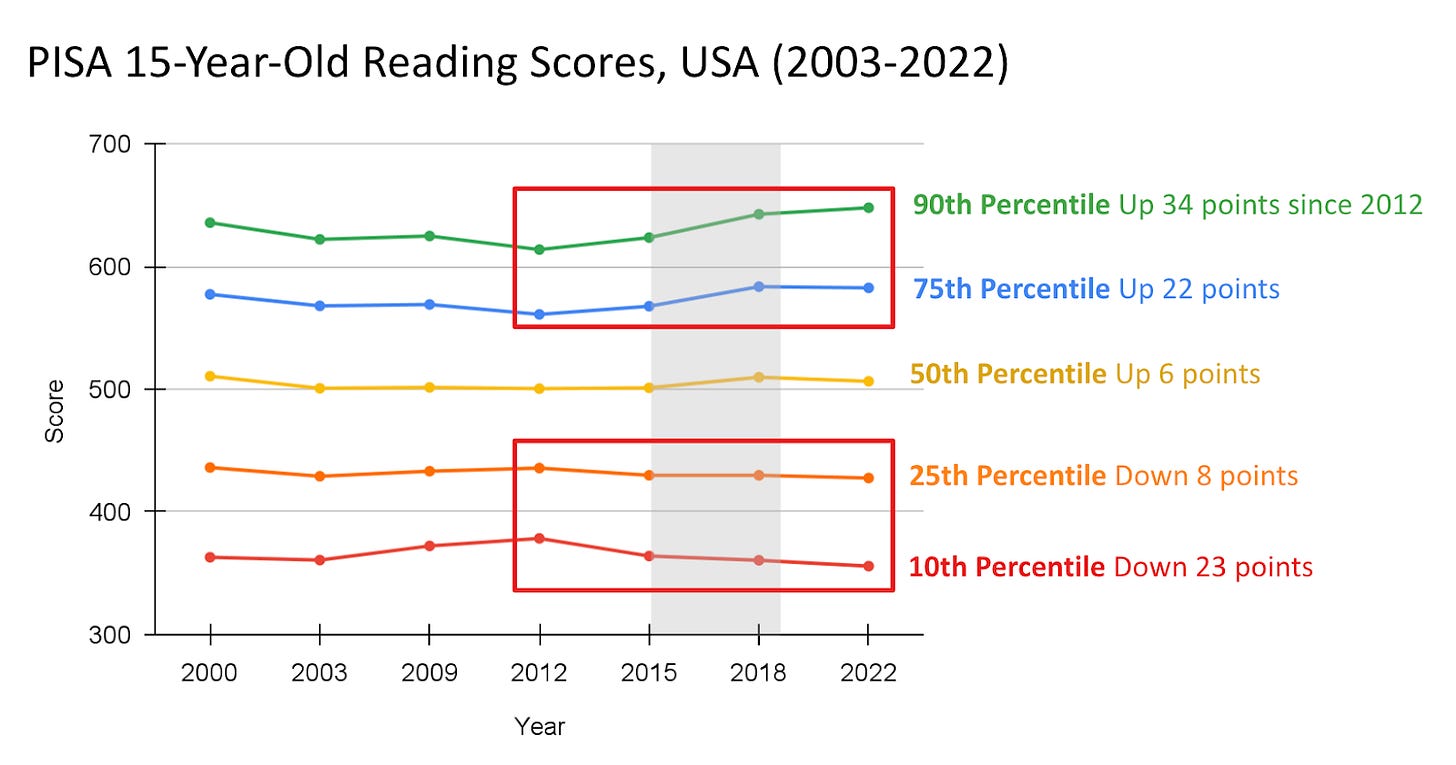
What we’re looking at is reading inequality.
“Scores for lower-performing students have declined significantly, while scores for higher-performing students have remained steady or improved.”
They offer a few possible causes:
Rapid changes in technology in school — a massive shift toward device-based education
Rapid changes in technology outside school — adolescents began sinking significant amounts of their free time into smartphones and social media
The Common Core Standards Initiative — a roll-out of changes to US school regulations, curricula, and assessment methods introduced in 2010
“Perhaps digital technologies – which were sold as products that would decrease inequalities – actually widened them.”
The big frustration here is that reading actively contributes towards social mobility — so this trend is heading straight to a reduction in real life options for the lowest-performing students after they leave education.
Read the full article here.
Worth a read 💯
I (Graham) have just read
’s 2016 book, ‘The Revenge of Analog (Real Things and Why They Matter)’. Simply put, it is excellent.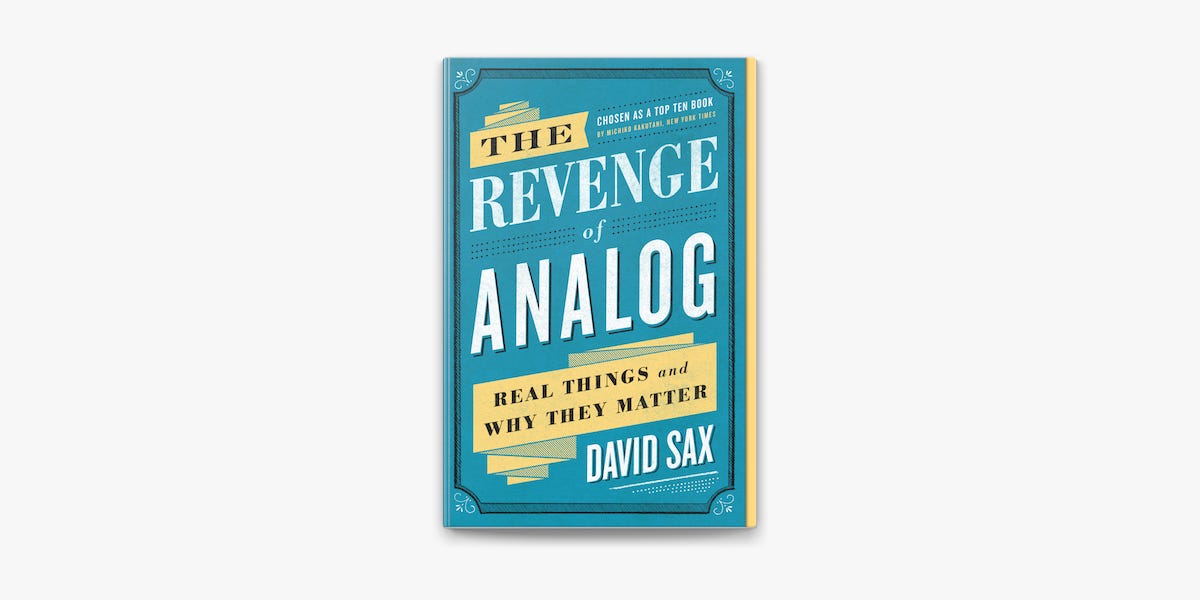
The book is split into two main themes:
The Revenge of Analog Things (Vinyl, Paper, Film, and Board Games) and;
The Revenge of Analog Ideas (Print, Retail, Work, and School).
The world has moved fast over the last ten years, but Sax’s work here feels more relevant than ever. We risk becoming disembodied as the digital world seeps into every crack in our lives, and yet, we feel more acutely aware of the rejuvenation that comes only through real things: concerts, food, travel, friendship… and books.
Quote
“The nineteenth- and twentieth-century model of education was to prepare workers to get a job and follow instructions… the world has changed. You need to think for yourself today. That’s how you find success. To me, that shift is the purpose of education: to be critical thinkers and creative problem solvers.”
— Leslie McBeth (teacher at Greenwood College School, Toronto), quoted in The Revenge of Analog.3
That’s all for today. Have a wonderful weekend.
As is so often the case with such talented individuals, Nicola’s parents were primarily responsible for creating the conditions for her success (to a degree that some would consider extreme).
From the article: “Benedetti’s own upbringing was privileged. Her entrepreneurial father, who came to the UK from his native Italy at the age of 10, made millions after inventing a revolutionary cling film dispenser. Her Scottish-Italian mother made her and her older sister Stephanie (now a violinist with the group Clean Bandit) practise the violin for three hours every day during the school holidays. Recently, Benedetti has found herself questioning the way she and Stephanie were brought up. “My daughter is only one, but my sister has two children, aged three and five, and seeing her experience has definitely made me consider our own childhood,” she says. “But both of us have a realistic, even positive view of our upbringing. It was very strict – we feared upsetting our parents, or doing the wrong thing – but we also knew we were loved to death by our mum and dad.”
David Sax, The Revenge of Analog (2016) - pp199



